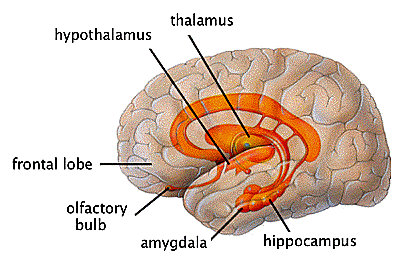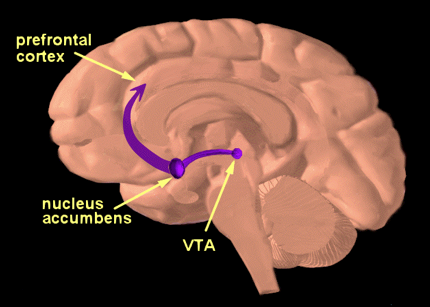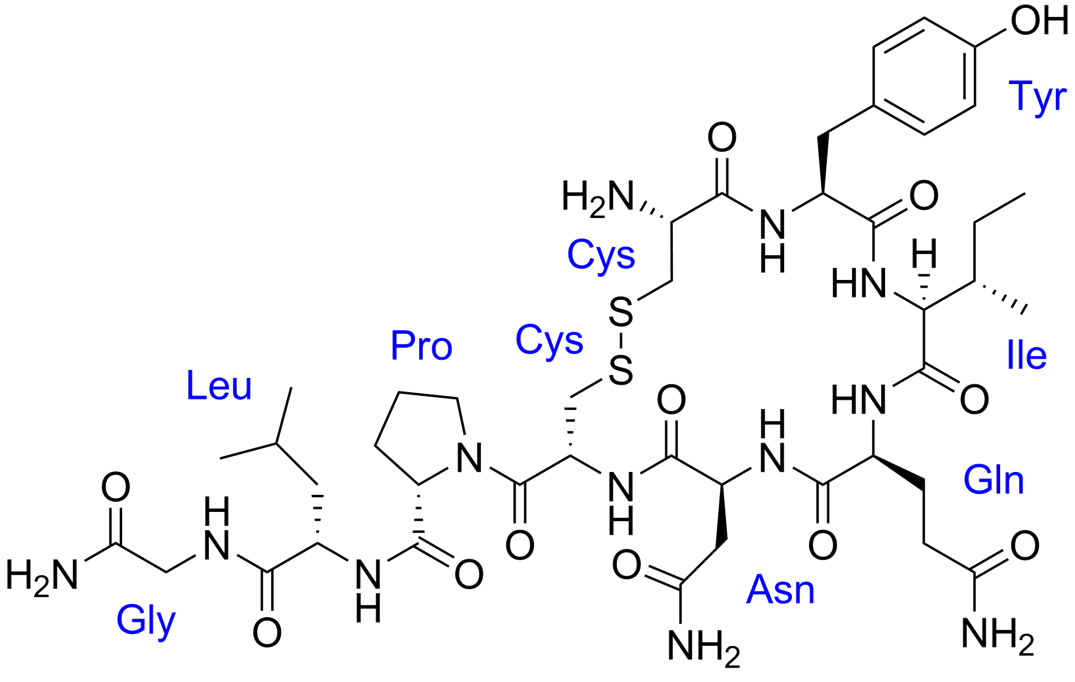Let’s Talk!
Many books on sexuality promote orgasm as the ultimate goal of sexual encounters. Also, most men view making their woman come as proof that they are good lovers. However, there is dark side to frequent intense orgasms, and it is rarely discussed. This hidden negative effect can put both our emotional health and the harmony of our romantic relationships at risk.
Orgasm happens in the brain, although obvious bodily changes are observed during sexual arousal. The electric impulses of nerve cells found in the limbic system are responsible for the experience of orgasm. The limbic system is the seat of uncontrollable primal drives, impulses and all kinds of desires, which include sexual desire (see picture below). This system is located right beneath the large, rational neo-cortex, and mating behaviours involve both the activation and deactivation of certain of its parts.
 Brain Limbic System (left side view)
Brain Limbic System (left side view)
The centerpiece of the limbic system is the reward circuitry and dopamine is the principal neurochemical that activates this circuitry (see picture below). Dopamine is a catecholamine neurotransmitter that is produced by neurons whenever you engage in activities that support your survival (i.e., sex, eating, achieving goals). The more dopamine neurons release, the more your reward circuit is activated, and the greater your desire for that particular thing.
 Brain Reward Circuitry (VTA=Ventral Tegmental Area)
Brain Reward Circuitry (VTA=Ventral Tegmental Area)
Dopamine is insatiable, and loves newness as well as the unexpected (see molecular structure below). It also controls cravings, but after we have obtained the object of our desire, opioids such as morphine and endorphins enable us to enjoy the experience.
 2D Structure of Neurotransmitter Dopamine
2D Structure of Neurotransmitter Dopamine
Addiction is closely linked to dopamine, and any substance (i.e., cocaine) that stimulates the dopamine production may be addictive. Our natural production of dopamine is at its highest during orgasms, especially following intercourse for both males and females. In fact, brains that are experiencing the big “O†resemble those experiencing a heroin rush.
Nerve cell receptors that are exposed to high doses of dopamine become less sensitive to this neurotransmitter as the brain tries to calm itself down. Over time, there may be fewer of these dopamine receptors and more intense stimuli are needed to produce the same high. Furthermore, the amount of the neurohormone prolactin greatly increases, which creates a sensation of sexual satiation, but also the temporary inability to have another orgasm right away. Prolactin also suppresses dopamine and therefore acts as the “brakes†for orgasm.
Other brain chemical changes occur. Enkephalins (endogenous opioids) increase and inhibit oxytocin (the bonding hormone). Oxytocin may be produced because of the muscle contractions that accompany orgasm. This interaction of brain chemical results in an overall decrease of feelings of satisfaction.
Similarly to other addictive substances, intense orgasms produce an initial powerful pleasurable experience, but is followed by a “hangover†effect. This “hangover†is the result of the sudden drop of dopamine in the brain, and we may become irritable for about two weeks.
Even small changes in neuron sensitivity or production of dopamine can have a profound effect on our perception of the world and our partners. Dopamine helps us bond with our partner, and if this neurotransmitter decreases, we may find our love interest less rewarding and the bond may be strained.
Since few people are aware of the link between dopamine and orgasm, many feel moody after an intense sex session, and do not understand why. Some may try to medicate these blues by eating, drinking alcohol or watching porn in an unconscious attempt to raise their dopamine level. However, these “solutions†only aggravate the problem by again raising dopamine to an abnormally high level.
It is interesting to note that very sexually active individuals tend to be prone to other types of addictions. The dopamine rollercoaster may prompt these individuals to medicate themselves in an attempt to normalize their brain chemistry.
One of the major risks of this dopamine cycle is that this neurotransmitter thrives on novelty. Even after being sexually satiated, many people (especially men) can easily get aroused in the presence of a new sexual partner. This phenomenon is called the “Coolidge Effectâ€.
The “Coolidge Effect†term was first used by Ethologist Frank A. Beach in 1955 based on an old joke about U.S. President Calvin Coolidge. Apparently, the president and his wife were doing a separate tour of an experimental government farm. At the chicken yard, Mrs. Coolidge noticed that the rooster was mating very frequently. She inquired with the attendant and was told that this behaviour happened dozens of times a day. Mrs. Coolidge said, “Tell that to the President when he comes by.†When the President was given that message, he asked, “Same hen every time?†The attendant replied “Oh, no Mr. President, a different hen every time.†The President responded “Tell that to Mrs. Coolidgeâ€.
The Coolidge Effect has been identified in almost all species, and in some animals (i.e., male rats), the male will continue to mate until he almost dies of exhaustion. In humans, this phenomenon can set the stage for sexual infidelity and a host of problems ensuing from this indiscretion.
 2D Structure of Hormone Oxytocin
2D Structure of Hormone Oxytocin
How can we remedy this problem? First, stop all sexual activity for at least two weeks. Second, avoid sex that aims at producing intense orgasms. Third, sexual encounters should last for as long as possible and include lots of affection/light touch. In this setting, oxytocin (the cuddle hormone) rises at the same rate as dopamine, and the sexual partners are able to experience a combination of excitement and calmness. The good news is that the more oxytocin produced, the more sensitive nerve cells are to this hormone. Therefore, there is no biochemical rollercoaster or Coolidge Effect.
Sex is a fascinating subject – especially orgasm. Although we are awash in information about orgasms, many of us are misinformed. The type of sex that is commonly promoted can have a profoundly negative effect on our overall wellbeing and the health of our romantic relationships.
A complex interaction of neurotransmitters and hormones make orgasm possible, of which dopamine is the key factor. Luckily, there is a loophole in this biochemical rollercoaster/Coolidge Effect, and it is the hormone oxytocin. Mother Nature is wise enough to enable us to both feel an intense desire for our partner (dopamine) and deep attachment (oxytocin) so we are able to bypass the dark side of the big “Oâ€.
Literary Truths
Here are other health benefits associated with the hormone oxytocin:
- Reduction of cravings: oxytocin helps recover from other types of addictions such as cocaine, morphine, and heroin. Also, there are fewer symptoms of withdrawal.
- Greater calmness: oxytocin calms the individual and the people s/he comes in contact with.
- Faster recovery: companionship raises oxytocin, and people with serious diseases (i.e., HIV positive) live longer and recuperate faster.
- Less depression: oxytocin counteracts cortisol (a stress hormone) that is often responsible for depression and anxiety disorders.
- Greater sexual receptivity: oxytocin reduces impotence and renders sex more pleasurable.
Truth in Motion
References
Klotter, Jule. “Addictive Drugs & the Brain.” Townsend Letter for Doctors and Patients (2001): 59.
Orgasm’s Hidden Cycle
Powledge, Tabitha M. “Addiction and the brain.” BioScience 49.7 (1999): 513.
“Sexual satiety higher after intercourse than after masturbation.” Journal of Men’s Health & Gender 3.2 (2006): 193.
Ventral Tegmental Area Picture
Welberg, Leonie. “Dopamine’s expanding universe.” Nature Reviews Neuroscience 10.9 (2009).
Awesome work, Junon – fits right in with the site:
http://www.theriseoferos.com/
Thank you for your diligent, scientific research and reportage on this pivotal topic that can stop our true joy in life in its tracks. Sexuality as it is promoted by today’s mainstream media culture can impact in a very negative way the lives of girls, women, boys and men.
Thank you for caring enough about our true sensuality and pleasure in life by integrating sexuality in with our spirits and whole lives!
I love the way you framed this specific concern, plus it does provide me with a lot of food for thought. I hope that as other people comment on this post, they continue to focus on the core issue. Thank you for this excellent piece, and even though I can’t go along with the idea in totality, I value your viewpoint.
Finally, a high quality website that isn’t in my face aiming at consistently advertise me something. Many thanks. Make sure you keep up the great work.
Fantastic post! I’m actually in need of information about k9 training but came across this post, and found it really interesting and beneficial. Keep up the great work you are doing here.
I don’t understand how I discovered your blog because I was researching details about politics. Anyway, I had a nice time reading it, keep it up!
I don’t care how the others who commented here are feeling about your article – I still like it.
Hey there. I found your blog using msn. This is a very well written article. I’ll make sure to bookmark it, and come back to read more of your useful information. Thanks for the post.
I think you have a great blog. I found it on Bing, and plan on returning regularly for the information that you’re providing.
Pingback: financial planning
It’s my first time on this site, and I’m really excited about it. So many good articles, I think it’s just very good.
What a great blog and revealing post.
Thank you for the good information on your website. My time-consuming internet look-up has at the end been rewarded with really good know-how to go over with my contacts. Readers are undoubtedly blessed to have a community with outstanding individuals with insightful ideas. I feel grateful to have visited this website and look forward to tons of more cool times reading its content. Thank you once more for all this information.
My blog is about healthy diet.
Great blog here! Also your web site loads up very fast! What web host are you using? Can I get your affiliate link to your host? I wish my web site loaded up as quickly as yours. lol
I’m thinking about removing my blog from Tumbler and get it to a WordPress blog. I believe this is a wordpress blog right? If it is, may I ask where you got the theme? Thanks a bunch!
Thank you for visiting my website.
Yes, this a WordPress blog and the theme is Mondo Zen 2.2 by Catarina Yamamoto. I got this theme through the hosting company Hostmonster.
Best regards,
J.M.
Thank you! I finally came to a site where the webmaster knows what they’re talking about. Do you know how many results are in Google when I search? Too many! It’s so annoying having to go from page after page after page, wasting my day away with thousands of people just copying each other’s articles… bah. Anyway, thank you very much for the info, much appreciated.
Exceptional post. However I wonder if you could write a little more on this topic? I’d be very grateful. Thanks!
This is an interesting article. Thanks for sharing.
Interesting post!
Very interesting information! Just what I was looking for!
Valuable information. Lucky me, I found your website by accident. I’m very surprised it didn’t happen sooner! I bookmarked it.
This is a well done article that I have bookmarked for future reading.
Again, great post! I’m looking forward to your next post!
Excellent website. A lot of useful info here. I’m sending it to some friends and thanks for your sweat!
Hey friend. Can I publish some paragraphs of your article on my little university blog? I have to publish a good article, and I really think your post fits well. I will add a link back to your website on my site. I have two blogs: one is my own and the other is my college blog. I will publish some parts in the university blog. Hope you don’t mind.
Thank you for visiting my blog and appreciating its content. However, as already mentioned on my website:
*No part of this website’s content may be used or reproduced in any manner whatsoever except by a reviewer who may quote brief passages in a review. Only short referenced quotes (i.e., a few sentences) or paraphrasing the ideas are acceptable options. The other alternative is to add a direct link on another website to this website.*
Regards,
J.M.
Howdy. Your blog site is quite exciting. I’m glad I read this post, it is quite insightful. Please e-mail me so we can converse about this in-depth. Keep up the good work. I look forward to reading more of of your articles in the future! Cheers.
You hit the nail on the head with this one. Great post!
Wonderful writing. I came across your writing through MSN search engine. I may read your articles often and share it with my neighborhood. Please keep it fresh. – A college student
Just stumbled across this article. You probably hear this often, but this is a very well written article. Thumbs up!